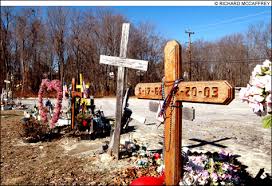A decade in alt-journalism in RI: 2003-2006

Part II, with more excerpts . . .
In 2003, we checked in with the Columbus Theatre, documented the heartbreak of the Station nightclub disaster, traced the maturation of RI's Latino political movement, walked tough neighborhoods with the Providence streetworkers, and looked at how new media was influencing politics:
Campaign Web sites have proliferated over the last decade, expanding the spread of information from print and broadcast mediums. This time, though, [Howard] Dean's self-styled outsider campaign has enjoyed singular success in attracting a greater number of smaller campaign donations, transforming the Internet from a passive medium into an active tool for diffusing political power through the masses. Indeed, with Bush’s war chest expected to grow close to an unprecedented $200 million, Dean’s supporters hold out hope of using the ’net as an equalizer. As Joe Trippi, Dean’s campaign manager, recently told the National Journal, "There’s only one medium in the world that allows two million Americans to contribute $100 in one day if they decide to do it. And that’s the Internet . . . I really believe there are two million Americans who will give $100 [equaling a total of $200 million] to get rid of George W. Bush."
By 2004, some of David Cicilline's supporters were disappointed by his move toward the center, Wal-Mart was encroaching, Steve Laffey was on the march, I was at the DNC in Boston, and Jim Taricani was in a fix:
So there was Taricani, a news veteran familiar with the frequent juxtaposition of local politics and criminality, having a cup of coffee at the Au Bon Pain near Providence’s federal courthouse on the morning of his November 18 trial, when in walks W. Dennis Aiken, the FBI agent who led the effort to nail Cianci.
Taricani, who has known Aiken for more than 20 years and considers him a friend, says the agent "puts his arm around my shoulder, shakes my hand, and says, ‘Good luck today.’ " The two men proceeded to talk, Taricani says, about special prosecutor Marc DeSisto’s attempt to identify the source of the leaked videotape by getting those who had access to it to sign waivers that would release Taricani from a promise of confidentiality. Taricani, describing how prosecutors can pressure people to sign the documents, allowed that his source had already signed such a waiver, and that DeSisto had shown it to him. Thus, in a move that Taricani says was unintentional, he made it possible for the prosecutor to identify his source as lawyer Joseph A. Bevilacqua Jr., since his waiver was the only one that DeSisto had shown Taricani. "It’s my mistake," Taricani told the Phoenix in a recent interview. "I have to take responsibility for it."
In 2005, I broke the news about a push for Clean Elections, offered a profile of Ed Achorn, described the unlikely victory in the fight for medical marijuana, and sketched a new generation of young RI political activists:
A recent get-together on Providence’s East Side had all the hallmarks of a successful house party: an eclectic throng of guests, a steady stream of lively banter, and the usual tendency of some of the visitors, scrounging for stray Heinekens, to gravitate toward the kitchen. But this wasn’t just the routine revelry of young adults. The November 18 gathering that attracted more than 200 people to Providence Mayor David N. Cicilline’s Elmgrove Avenue home marked the rebirth of an emerging force in state politics, the Rhode Island Young Democrats.
By 2006, NYT heir Arthur Gregg Sulzberger was doing his time at the ProJo, Cicilline was trying to remake the City Council, the Caprios were on the rise, Sheldon Whitehouse had the advantage over Chafee, Mark Arsenault was writing mysteries, and the Station was casting a long shadow:
The encouraging sense of a state coming together in response has long since dissipated, as has the sacred, 9/11-like quality that initially surrounded the tragedy and its aftermath. Even by the first anniversary of the disaster, many survivors expressed a sense of feeling overlooked.
This is human nature. We put out of mind and forget nearby unpleasantness and those things perceived as not directly concerning us.
Yet the Station nightclub disaster, a half-decade on, is also a story of determination and resilience, of the survivors — many of whom still wrestle with their injuries, a diminished ability to earn a living, and the expense of medical bills — trying to move forward while not being able to put far away the night of the fire.